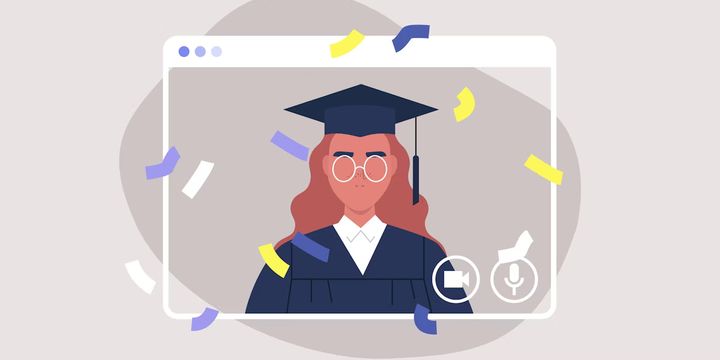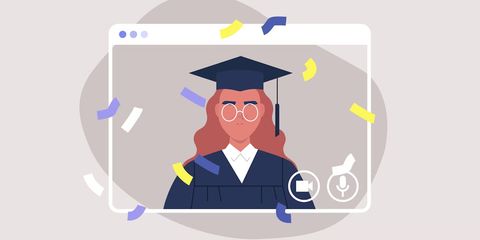
Solutions for Lifelong Learning: How-to Master the Online Degree
An online degree is an academic qualification earned through a virtual, internet-based learning platform. Unlike traditional education that requires physical presence on a campus, online degrees offer students the flexibility to pursue their studies from virtually anywhere in the world. The rise of this educational model is not a recent phenomenon but a culmination of decades of technological advancement, coupled with a growing demand for education that fits modern life. High-speed internet, sophisticated learning management systems (LMS), and interactive digital tools have made it possible to replicate the classroom experience online.
Why Online Degrees Are Crucial Today

In today's fast-paced world, online degrees are no longer a niche option; they are a vital component of the global education landscape. Their importance is underscored by the way they address critical issues of accessibility, flexibility, and career development.
Who It Affects
Working Professionals: Online degrees allow individuals to upskill, reskill, or pursue a master's degree without having to quit their jobs. This allows for continuous professional development and career progression in a competitive job market.
Students in Remote Areas: For students in rural or remote regions who lack access to nearby universities, online learning provides a direct link to quality higher education that was previously out of reach.
Parents and Caregivers: Individuals with family responsibilities can pursue their educational goals on a flexible schedule that accommodates their obligations.
Individuals with Disabilities: Online degrees remove physical and logistical barriers, making advanced learning more accessible and inclusive for students with mobility or other health-related challenges.
Problems It Solves
Accessibility and Equity: Online degrees democratize education by removing geographical and physical barriers. They ensure that high-quality learning is not restricted to those who can afford to live near prestigious universities, thus promoting a more equitable educational landscape.
Flexibility and Work-Life Balance: The self-paced and asynchronous nature of many online programs allows students to create their study schedules. This flexibility is essential for working adults and those with other commitments, enabling them to pursue education without sacrificing their professional or personal lives.
Cost of Education: By eliminating expenses such as on-campus housing, transportation, and meal plans, online degrees can significantly reduce the overall cost of a degree. This makes higher education more affordable and reduces the financial burden on students and their families.
Rapid Skill Development: In a job market that is constantly changing, online degrees allow professionals to quickly gain new skills and knowledge in response to industry demands. This agility is a key to staying relevant and competitive in a dynamic economy.
Recent Updates and Trends
The landscape of online degrees is in a constant state of evolution, driven by technological innovation and shifting perceptions. The past year (late 2024 to mid-2025) has seen several significant trends.
Increased Employer Acceptance: A major shift has been the growing recognition and acceptance of online degrees by employers. According to a 2025 global report by the Graduate Management Admission Council (GMAC), employers outside the United States, particularly in the technology sector, now view online and in-person degrees as equally valuable. Many companies have realized that a degree's value lies in the skills and knowledge of the graduate, not the medium of delivery.
Personalized Learning with AI: Artificial intelligence is being increasingly integrated into online learning platforms to create personalized learning experiences. AI can analyze a student's performance, identify knowledge gaps, and recommend customized learning paths and resources. This adaptive approach ensures that each student receives the support they need to succeed, improving engagement and learning outcomes.
Growth of Hybrid and Blended Models: The concept of online education is no longer confined to fully virtual programs. Many universities are now adopting hybrid models that blend online coursework with short, on-campus residencies or in-person practical sessions. This "blended learning" approach offers the best of both worlds, providing flexibility while retaining the benefits of face-to-face interaction and hands-on learning.
Expansion of Top-Tier Universities: Historically, online degrees were often associated with smaller or specialized institutions. However, an increasing number of world-renowned universities are now offering accredited online degree programs. This expansion by top-tier institutions lends credibility to the online degree format and gives students a wider range of high-quality options.
Laws and Policies in India
The regulation and promotion of online degrees in India are governed by specific policies and government bodies, most notably the University Grants Commission (UGC) and the National Education Policy (NEP) 2020.
UGC Regulations: The UGC is the primary body responsible for regulating online and distance learning in India. The UGC (Online Courses or Programmes) Regulations, 2020 sets the standards for higher education institutions offering online degrees. It mandates that online programs must be offered by institutions with at least a NAAC accreditation of "A++" or a top-100 ranking in the National Institutional Ranking Framework (NIRF). The UGC also maintains a public list of universities and programs approved for online learning to ensure transparency and protect students from unaccredited providers. Recent updates, such as a notice in August 2025, have clarified rules for certain fields, with the UGC temporarily banning online degrees in healthcare and allied disciplines to ensure quality and hands-on training.
National Education Policy 2020 (NEP): The NEP 2020 strongly advocates for the use of technology to expand access to quality education and improve India's Gross Enrollment Ratio (GER). The policy explicitly promotes Open and Distance Learning (ODL) and online learning to cater to a diverse range of learners. It encourages a shift from rote learning to more skill-based, flexible, and multidisciplinary education, which aligns perfectly with the model of many modern online degrees. The NEP also supports the concept of the Academic Bank of Credits (ABC), which allows students to earn and transfer credits between different institutions, providing more flexibility for those pursuing a degree through various online and in-person formats.
Tools and Resources
Online learning has a rich ecosystem of tools and resources that support students throughout their academic journey.
Learning Management Systems (LMS): The backbone of any online degree program is its LMS. Platforms like Canvas, Moodle, and Blackboard are used by universities to host course materials, lectures, assignments, and discussion forums. These systems provide a centralized hub for all learning activities.
Online Learning Platforms: Companies like Coursera, edX, and Udemy have partnered with top universities to offer entire degree programs online. These platforms provide a user-friendly interface and a wide range of courses, from single-subject certificates to full-fledged master's degrees.
Productivity and Collaboration Apps: To succeed in an online environment, students often rely on a suite of digital tools. Google Workspace (Docs, Sheets, Slides), Microsoft Teams, and Slack are commonly used for group projects and real-time communication.
Official Directories and Websites: Prospective students can use official government websites to verify the accreditation of a university's online program. In India, the UGC's Distance Education Bureau (DEB) website is the definitive resource for checking approved institutions.
Career Services: Many online degree programs now offer robust career services, including virtual career fairs, resume-building workshops, and one-on-one career counseling to help graduates find jobs after completing their studies.
Frequently Asked Questions
Are online degrees as credible as traditional degrees?
Yes, online degrees from accredited and recognized universities are now considered as credible as their traditional counterparts. The key is to ensure the university is recognized by a national accreditation body (e.g., the UGC in India) and that the program is from a reputable institution with a strong track record.
How do online degrees ensure academic integrity?
Online programs use a variety of proctoring and assessment methods to maintain academic integrity. These can include timed exams, remote proctoring software that monitors students via webcam, plagiarism-detection tools, and project-based assignments that require unique, original work.
What are the biggest challenges of studying online?
Common challenges include the need for strong self-discipline and time management skills, as well as the potential for feelings of isolation. Students must be proactive in engaging with the course material, participating in online forums, and communicating with instructors and peers to overcome these hurdles.
How do online students network with peers?
Networking in online programs happens through dedicated course forums, collaborative group projects, and social media groups. Many programs also host virtual networking events, guest lectures, and optional on-campus residencies to facilitate connections among students.
Conclusion
The rise of online degrees marks a significant and positive transformation in the world of higher education. They are no longer a fallback option but a legitimate and powerful tool for lifelong learning. By making education more flexible, accessible, and affordable, online degrees are democratizing learning and empowering a new generation of students, regardless of their location, age, or circumstances. As technology continues to evolve and regulatory frameworks become more robust, online education will continue to redefine what it means to be a student and how we access knowledge in the 21st century.






